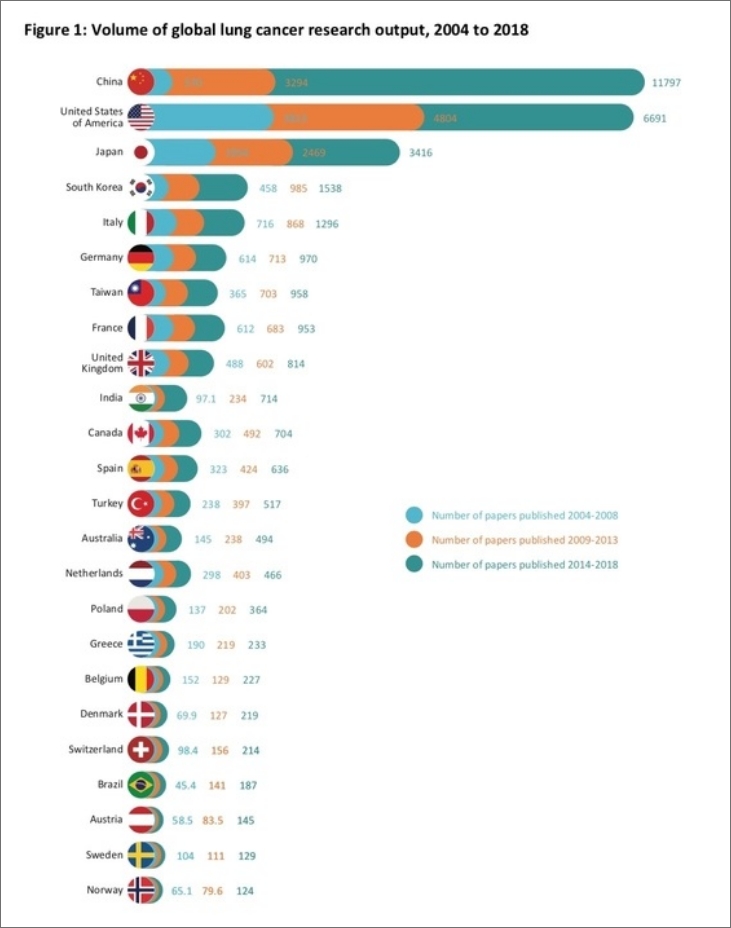GLCC studies reveal the state of research into lung cancer worldwide. 2020 findings provide a benchmark of world research prior to the impact of COVID-19
Research saves lives. Scientific advances have led to improvements in the prevention, screening, diagnosis and treatment of lung cancer. But there is still much more that we need to understand if we are to save more lives from the most common and deadly cancer in the world. [1]
The State of Global Lung Cancer Research is an ongoing project. In 2014, the GLCC commissioned the Institute of Cancer Policy (ICP) to examine the state of global lung cancer research.
Published in July 2016 in the Journal of Thoracic Oncology, that study [2]:
- Identified the top 24 countries publishing the most research into lung cancer
- Analysed whether research outputs had changed over time
- Showed that lung cancer research lagged behind both breast and colorectal cancers in terms of the volume of papers published
- Demonstrated that some aspects of the disease and its treatment were under-investigated, such as screening, diagnostics and supportive and palliative care.
The 2020 study from the ICP revisits and updates the findings [3].
You can download the Global Study as a read-only pdf document here and as a read-only Word document here.
Encouragingly, it shows the volume of lung cancer papers published between 2004 and 2018 has increased. The proportion of overall global cancer research dedicated to lung cancer has also increased, though it still lags behind that dedicated to breast cancer. Every country in the top 24 has increased their research output. Some countries – notably China, South Korea, India and Brazil – have risen up the country rankings.
We publish this research at a significant moment.
Lung cancer research is funded by many different private and public sources. However, the COVID-19 pandemic has meant Government and industry rapidly refocussing research budgets towards diagnostics, vaccines and treatments for coronavirus. Research charities and not-for-profit organisations are also feeling the shock; half of the GLCC’s members have seen a decrease in income since the start of the pandemic. [4]
It is hard to imagine that COVID-19 will not have a profound impact on lung cancer research. But it is essential that lung cancer research budgets are protected as far as possible. This study provides an important benchmark for pre-COVID-19 lung cancer research output, from which we will be able to judge impact in the coming years.
The past decade has shown that research investment brings rewards. Advances have been made across the board in lung cancer – from improved screening and diagnostics, to surgical techniques and precision radiotherapy, to new targeted treatments and immunotherapies.
These advances are saving lives from lung cancer.
The investments we make in lung cancer research today will make a difference for patients tomorrow. We call on all countries to protect and invest in lung cancer research.

How has research output changed globally?
All countries in the top 24 responsible for the majority of lung cancer research have increased their research output between 2004 and 2018. Overall, the volume of published research has nearly tripled, rising from 12,508 papers between 2004 and 2008 to 35,720 papers published between 2014 and 2018.
Fig 1: World Cancer Research Fund, Lung Cancer Statistics, available here: https://www.wcrf.org/dietandcancer/cancertrends/lung-cancer-statistics
You can read more granular detail – at individual country level – in the Country Level Briefing section.
The Institute of Cancer Policy (ICP) brings together a distinguished global faculty dedicated to policy to improve care, education and research in global cancer. Based at King’s College, London and King’s Health Partners, the ICP conducts research into some of the world’s most important cancer public policy issue affecting the most vulnerable cancer patients.
Collaborating through a network of local, national and global partners, the ICP’s mission is to conduct high quality, critical cancer policy research to improve the lives and outcomes of all cancer patients, in all settings.
You can read more about the ICP’s work at: http://instituteofcancerpolicy.org


